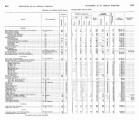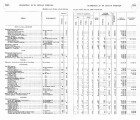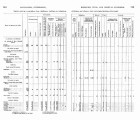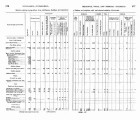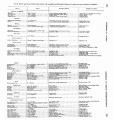| OCR Text |
Show REPOZT OF BUPERINTENDENT OF INDIAX SOHOOLB. 443 Thus they will be brought under the influence of intelligent Chris-tian civilmation. Besides the ap eal to their better nature and a gen-tle but firm leading toward a higF l er moral and religious life, a.know1- edge of the true worth and dignity of labor will be inculcated in their minds. l'FIE MORAL STATUS OF THE EDUOATTONAL WORK. The .problem of Indian civilization moves slowly toward solution. Most transformations are gradual, and principles deep in human nature underlie them. While we who immediately su ervise the schools realize the magni-tude of our work, we do not fee? that the whole burden rests on us. The gradual freeing of the Indian from the reservation system is throw-ing more and more of the responsibility on him, and, as another has stated, what he "most needs is not so much a protector as a friend." To meet this want all versons whom official or Christian duty has placed in touch with him b&r a part. The moral work within the educational is one of tremendous import. Our hope is in education based on character and carried largely dong industrial lines. All knowledge is in a sense God's word, whose "entrance giveth light." The risin generation of InGns is in our hands to be helped in rowth towarfthe larger life which the age has prepared for us all. $0 this end we are endeavoring to strengthen the efficient1 b y instituting such measures as will increase the moral pur- pose an the educational tact of the school force. We are aiming at the unification of the Indian school system in all that tends to the formation of self-supporting, God-fearing Indian men and women. The new movemen& that are calling for the reorganization of the school systems of every nation are aiding us. We find that there is , no ~i inc i a l ew ithin these movements that. under modification. does not'applfto our work. Technical skill, which is found to be so great a factor in education, predisposing to "truthfulness of speech by the truthfulness of work," 1s a means we employ. We believe we can instill the "property sense," and a consciousness of the dignity of labor at the same time. that we are giving the pupils a practical knowledge of agriculture and of the work reqmred in everyda life. There is a res nsiveness to edical training in the Indian's soul as well as in the wEte man's, and when we have taught the Indian the speech of civilization and the crafts required by bis environment, he may safely pass from our hands to the saving power of self-effort. The Indians themselves are now helping us. They are coming from their schools togive us in our teachers' ir.stitutes in refined langu suggestions of what will best subserve the wellare of their The educational elements of the schools have so entered the their being that they naturally take their place beside us and say, "We are at one with you in this great work." The missionary spirit is there, and with them effort "be ins at home." Thus the moral growth of the 1nfian has even now reached the stage when its result8 are of practical utility, and as all races have been saved not so much "from error as through error," we look forward not to an "extinct race," as has been predicted, but to a race into which the national life will have so entered that the engrafted branch and the vine are one. |






























































































































































































































